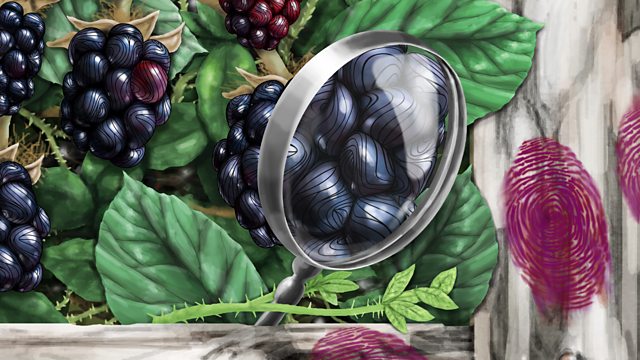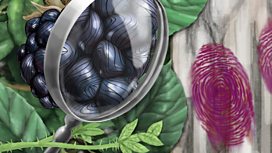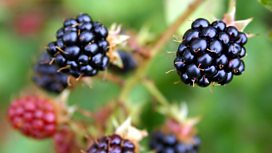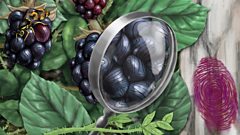Brambles
Brett Westwood explores how brambles appear in art, literature, forensics and religion. From children's books to blackberry picking to unravelling serious crime.
Brambles are a common reminder that nature is not just about us. The tangled confusion of spikes and tough stems tear flesh and cloth alike - the long, sinuous creepers creeping along tracks can trip those whose eyes stray from the ground. Tales from Brambly Hedge tempt children to the underworld of the bramble where homely mice families create a secure glow of domestic bliss safe from the dangers outside. Picking blackberries remains very popular and a wistful childhood memory, captured by Seamus Heaney's poem Blackberry Picking. This also echoes the dual nature of the bramble as both tormentor and giver of soft treats. Another dark side to this very common plant is the clues it gives to forensic botanists who use the bramble as an indicator of changed ground, noting if its growing pattern shows signs of disturbance, they can even detect the time the plant was dug up and recovered.The bramble is the commoner of the woodland, but says Richard Mabey, it performs an essential job in protecting young trees. Today BlackBerry is a smart phone, called after the fruit because the inventors knew that any name related to the term "email" made people's blood pressure rise, so they went for a natural, playful, happy-memory inducing name. It has now been twisted into urban slang - "going blackberry picking" now means to go out and steal phones. The humble blackberry, and there are over 650 different species, has many hidden depths.
Last on
![]()
How forensic botany can help solve serious crimes.
![]()
How much do you know about the prickly plant and its fruit?
![]()
Hugh Fearnley-Whittingstall shares his recipe for a gorgeous granita.
Clips
-
![]()
The World According to Bramble
Duration: 01:09
-
![]()
'The blackberry is the devil's fruit'
Duration: 01:01
-
![]()
How brambles can help solve murder cases
Duration: 02:20
Dr Mark Spencer

Mark also has an interest in historic botany, particularly 17th and 18th century herbariums as well as non-native invasive species.聽He is committed to engaging with and educating the wider British public about the value and interest of Britain鈥檚 flora. Mark鈥檚 botanical interests are wide-ranging but are particularly focused on the historic and non-native floras of London and the Isles of Scilly.
Mark is the vice-county recorder for Middlesex and the Vascular Plant Recorder for the .
Professor Francesca Dall鈥橭lmo Riley

Her research interests include the study of branding, omni-channel grocery shopping, behavioural and attitudinal loyalty to brands and services.
She has published widely in international journals, is and Associate Editor of the and sits on the Advisory Board of the and on the Editorial Review Board of the . 聽Francesca chairs the Academy of Marketing Special Interest Group in .
Richard Mabey

He is the , including Weeds: How vagabond plant gatecrashed civilisation (2010), Whistling in the Dark: In Pursuit of the Nightingale (1993), winner of the East Anglia Book Award, 2010, in a revised version entitled The Barley Bird, Beechcombings: the narratives of Trees (2007), the ground-breaking and best-selling 鈥渃ultural flora鈥� Flora Britannica (1996), winner of a National Book Award, and Gilbert White, which won the Whitbread Biography Award in 1986.
His memoir Nature Cure (2005), which describes how reconnecting with the wild helped him break free from debilitating depression, was short-listed for three major literary awards, the Whitbread, Ondaatje, and J.R. Ackerley prizes. He writes for the Guardian, New Statesman and Granta, and contributes frequently to 麻豆官网首页入口 radio. He has written a personal column in 麻豆官网首页入口 Wildlife magazine since 1986.
George Monbiot

罢飞颈迟迟别谤:听
Stuart Phillips

He works for聽聽as Product Development Manger for Forestry and Arboriculture and has been a聽regular contributor to gardening programmes on 麻豆官网首页入口 radio, giving gardening advice and answering listeners鈥� questions.
He is also the author of聽聽and he is聽a Fellow of the Linnean Society of London.
Professor Kim Reynolds

She has served on the board of a number of national bodies and has been a trustee of聽, the National Centre for Children's Books, since it opened in 2004. She has published widely across the history of children's literature including聽聽for Oxford University Press.
With the help of a Major Leverhulme Fellowship she recently completed a book called聽Left Out: the forgotten radical tradition of publishing for children in Britain, 1910-1949. This will be published by Oxford University Press in spring 2016.
Broadcasts
- Tue 15 Sep 2015 11:00麻豆官网首页入口 Radio 4
- Mon 21 Sep 2015 21:00麻豆官网首页入口 Radio 4








